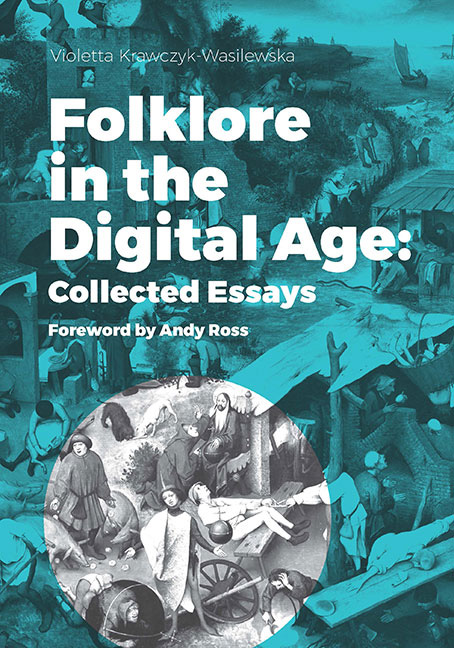Book contents
- Frontmatter
- Contents
- Acknowledgements
- Foreword
- I The Art of Bruegel and the Folklorist
- II e-Folklore as a Part of Digital Culture
- III Towards a Digital Folklore Heritage
- IV Post September 11: Global Fear vs Digital Humour
- V The Haiti Legends Revisited and the Power of e-Rumour
- VI The Global Dating Phenomenon
- VII Matchmaking through Avatars: Social Aspects of Online Dating
- VIII The Global Food Story and the Internet
- Bibliography
- Miscellaneous Endmatter
Foreword
Published online by Cambridge University Press: 22 December 2017
- Frontmatter
- Contents
- Acknowledgements
- Foreword
- I The Art of Bruegel and the Folklorist
- II e-Folklore as a Part of Digital Culture
- III Towards a Digital Folklore Heritage
- IV Post September 11: Global Fear vs Digital Humour
- V The Haiti Legends Revisited and the Power of e-Rumour
- VI The Global Dating Phenomenon
- VII Matchmaking through Avatars: Social Aspects of Online Dating
- VIII The Global Food Story and the Internet
- Bibliography
- Miscellaneous Endmatter
Summary
Folkloristics is the study of folklore using approaches and insights from science and the humanities. Folklore expresses a people's culture and heritage, and so helps define our ethnic and cultural identities.
Professor Violetta Krawczyk-Wasilewska, the author of the essays in this book, has enjoyed a long and successful career as a folklorist. She has worked with various folklore resources, most of them narrative genres, transmitted orally and locally, but also in printed and pictorial form. More recently she has expanded her resource base to include online folklore.
Online and digital cultures are both driving and following a process of globalisation. Global multimedia culture not only endangers traditional folklore but also creates new folklore, often in surprising ways. The miscellany of themes that the author touches upon in this book amply illustrate the range of modern folklore studies. My brief remarks here merely hint at that range.
Serendipity can play a role in such studies, as it did when the author discovered by chance, while browsing the web, a folkloristic painting known as The Netherlandish Proverbs painted in 1559 by Pieter Bruegel The Elder (chapter I). This fascinating work of art illustrates perhaps a hundred Flemish proverbs and sayings, most of them still in use in many European languages.
Today anyone at home with a tablet or a smart phone can read and write gossip, rumours, jokes, hoaxes, urban legends, chain letters, and fact and fiction of all kinds, and publish it worldwide in seconds. Much of the outpouring that results is highly ephemeral, but such ephemera are prolific breeders of new ephemera in an exploding profusion of what author calls e-folklore (chapter II).
New media are used both for serious business and for entertainment as well as for sharing personal opinions and emotions. The web has become a global folklore encyclopaedia, not only through Wikipedia but also as a platform for creating and publishing content of all kinds. This activity feeds the world of digital folklore, which now forms a major part of our collective human culture and heritage (chapter III).
The United Nations Educational, Scientific and Cultural Organization (UNESCO) has the mission to protect the world cultural and natural heritage, while promotion and protection of the European cultural heritage is regulated by the Council of the European Union.
- Type
- Chapter
- Information
- Folklore in the Digital Age: Collected Essays , pp. 9 - 12Publisher: Jagiellonian University PressPrint publication year: 2016



